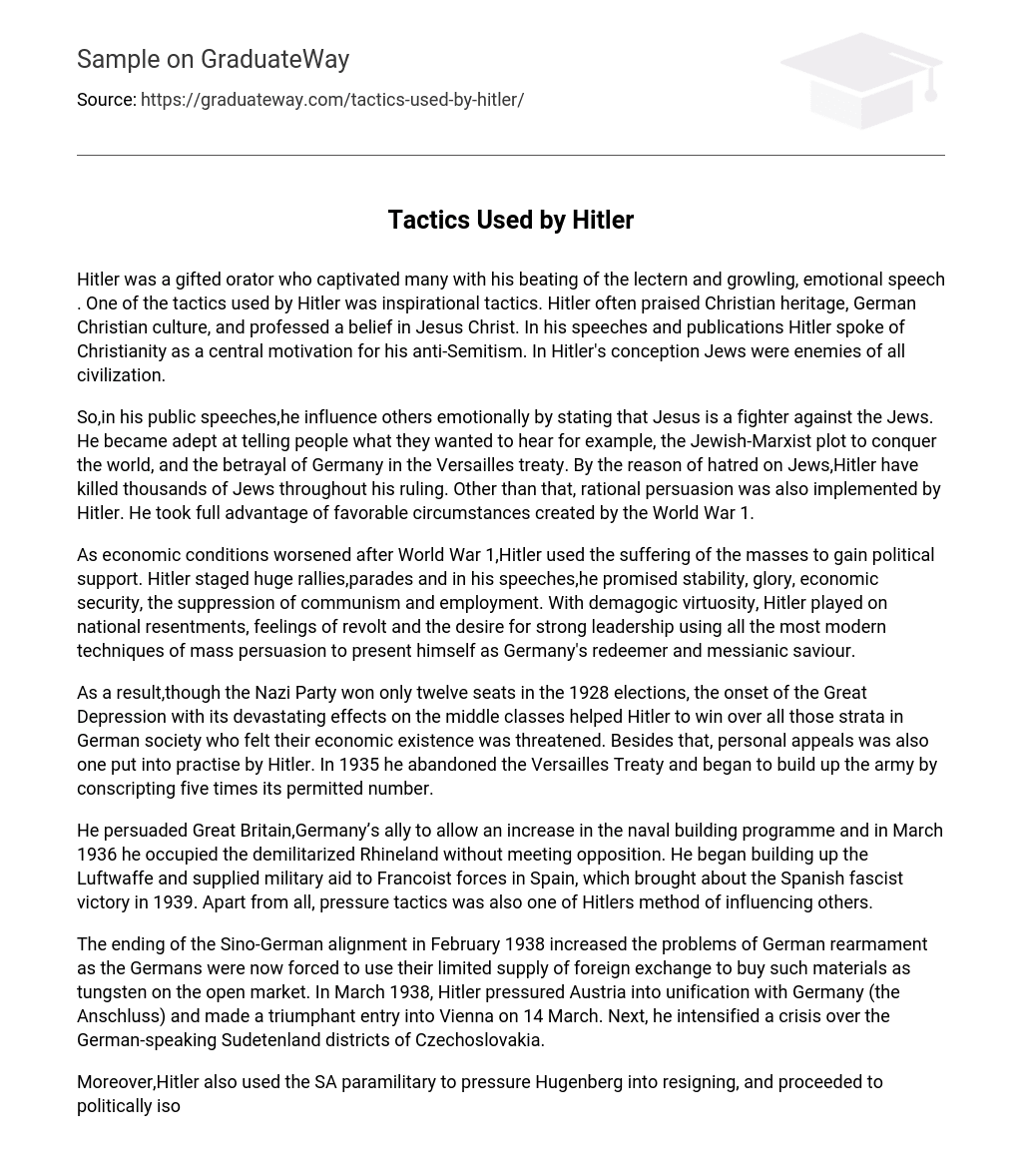Hitler was a gifted orator who captivated many with his beating of the lectern and growling, emotional speech . One of the tactics used by Hitler was inspirational tactics. Hitler often praised Christian heritage, German Christian culture, and professed a belief in Jesus Christ. In his speeches and publications Hitler spoke of Christianity as a central motivation for his anti-Semitism. In Hitler’s conception Jews were enemies of all civilization.
So,in his public speeches,he influence others emotionally by stating that Jesus is a fighter against the Jews. He became adept at telling people what they wanted to hear for example, the Jewish-Marxist plot to conquer the world, and the betrayal of Germany in the Versailles treaty. By the reason of hatred on Jews,Hitler have killed thousands of Jews throughout his ruling. Other than that, rational persuasion was also implemented by Hitler. He took full advantage of favorable circumstances created by the World War 1.
As economic conditions worsened after World War 1,Hitler used the suffering of the masses to gain political support. Hitler staged huge rallies,parades and in his speeches,he promised stability, glory, economic security, the suppression of communism and employment. With demagogic virtuosity, Hitler played on national resentments, feelings of revolt and the desire for strong leadership using all the most modern techniques of mass persuasion to present himself as Germany’s redeemer and messianic saviour.
As a result,though the Nazi Party won only twelve seats in the 1928 elections, the onset of the Great Depression with its devastating effects on the middle classes helped Hitler to win over all those strata in German society who felt their economic existence was threatened. Besides that, personal appeals was also one put into practise by Hitler. In 1935 he abandoned the Versailles Treaty and began to build up the army by conscripting five times its permitted number.
He persuaded Great Britain,Germany’s ally to allow an increase in the naval building programme and in March 1936 he occupied the demilitarized Rhineland without meeting opposition. He began building up the Luftwaffe and supplied military aid to Francoist forces in Spain, which brought about the Spanish fascist victory in 1939. Apart from all, pressure tactics was also one of Hitlers method of influencing others.
The ending of the Sino-German alignment in February 1938 increased the problems of German rearmament as the Germans were now forced to use their limited supply of foreign exchange to buy such materials as tungsten on the open market. In March 1938, Hitler pressured Austria into unification with Germany (the Anschluss) and made a triumphant entry into Vienna on 14 March. Next, he intensified a crisis over the German-speaking Sudetenland districts of Czechoslovakia.
Moreover,Hitler also used the SA paramilitary to pressure Hugenberg into resigning, and proceeded to politically isolate Vice-Chancellor Papen. In 1938,Hitler forced the resignation of his War Minister, Werner von Blomberg. Hitler replaced the Ministry of War with the Oberkommando der Wehrmacht (High Command of the Armed Forces, or OKW), headed by General Wilhelm Keitel. Ingratiating tactics was also applied by Hitler. A major initiative in Hitler’s persuation in his early years was to create an alliance with Britain.
In the 1920s, Hitler wrote that a future National Socialist foreign policy goal as being “the destruction of Russia with the help of England”. In October 1933, Hitler pulled Germany out of both the League of Nations and World Disarmament Conference to gain Britain’s support. Hitler, in a meeting in November 1933 with the British Ambassador, Sir Eric Phipps, offered a scheme in which Britain would support a 300,000-strong German Army in exchange for a German “guarantee” of the British Empire. A more successful initiative in foreign policy occurred with relations with Poland.
In spite of intense opposition from the military who preferred closer ties with the Soviet Union, Hitler, in the fall of 1933 opened secret talks with Poland that were to lead to the German-Polish Non-Aggression Pact of January 1934. Other than that,legitimating tactics was also used by Hitler. As part of his new plan,he decided to use Ludendorff as a front in an attempted coup later known as the Beer Hall Putsch. In 1923,Hitler and Ludendorff obtained the clandestine support of Gustav von Kahr, Bavaria’s de facto ruler, along with leading figures in the Reichswehr and the police.
As political posters show, Ludendorff, Hitler and the heads of the Bavarian police and military planned on forming a new government. On 8 November 1923, Hitler and the SA stormed a public meeting headed by Kahr in a large beer hall outside of Munich. He declared that he had set up a new government with Ludendorff and demanded, at gunpoint, the support of Kahr and the local military establishment for the destruction of the Berlin government. Kahr withdrew his support and fled to join the opposition to Hitler at the first opportunity.





